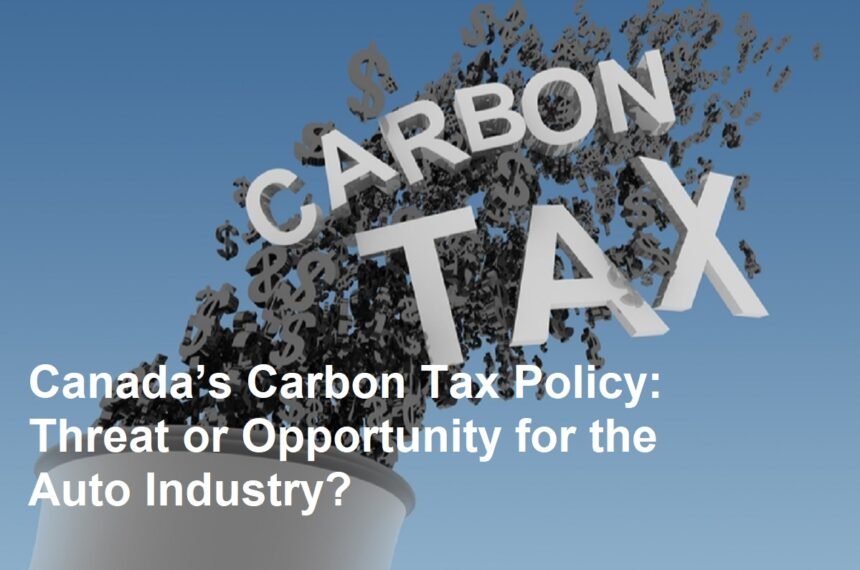Introduction: Why Canada’s Carbon Tax Matters
Climate policy is no longer just about the environment—it’s about economics, industries, and jobs. One of the most debated measures in North America is Canada’s carbon tax. For the auto sector, this has sparked questions: Is the Canada carbon tax on automotive industry a serious threat, or could it actually drive innovation and growth?
The truth lies somewhere in between. Depending on how automakers, investors, and consumers respond, this policy can either disrupt traditional business models or unlock new opportunities in a greener economy.
Understanding Canada’s Carbon Tax
What Is It?
Canada’s carbon tax is part of its green policy agenda. It puts a price on carbon emissions, meaning companies and consumers pay more if they use fossil fuels. The idea is simple: the higher the cost of polluting, the faster industries will innovate toward cleaner solutions.
Why the Auto Industry Feels the Pressure
The automotive sector is a key target. Cars and trucks are among the largest sources of emissions in Canada, and the government wants to push people toward electric vehicles (EVs) and other eco-friendly alternatives.
Canada’s Green Policy and Its Auto Implications
The Bigger Picture
The green policy of Canada is about more than just taxes—it’s about transitioning the economy. For automakers, this means:
- Stricter fuel efficiency standards
- Incentives for EV production
- Heavy investments in charging infrastructure
Opportunities in Eco-Friendly Innovation
Automakers that adapt quickly will benefit from subsidies and consumer demand for greener cars. Those that resist risk losing competitiveness, not just in Canada but across the North American automotive industry.
The North American Auto Industry: A Shared Challenge
Integration Across Borders
The North American automotive industry is deeply interconnected. Canadian plants supply parts to US and Mexican factories, while American automakers sell millions of vehicles in Canada. This means Canada’s carbon tax has ripple effects beyond its borders.
How US and Mexican Automakers Respond
- US automakers: Ford and GM are accelerating their EV investments partly to align with Canada’s green agenda.
- Mexico’s role: As a manufacturing hub, Mexico may face pressure to adopt greener practices if it wants to stay competitive in exports.
Eco-Friendly Regulations: The Global Context
Canada and the EU/US Comparison
Canada’s eco-friendly regulations are in line with what Europe and the US are doing. The EU has already approved a 2035 ban on new gasoline cars, while the US is investing heavily in EV infrastructure. Canada doesn’t want to be left behind.
Risks of Falling Behind
If Canadian automakers don’t embrace green regulations, they risk losing market access in regions with strict climate policies.
Practical Insights for Different Stakeholders
For Car Buyers
- Expect rising fuel costs: With the carbon tax, gasoline will keep getting more expensive. Switching to an EV or hybrid may save money long-term.
- Look for incentives: Canada offers rebates and tax credits for EV buyers—making the switch more affordable.
- Plan charging solutions: Check whether home or public charging is available in your area before buying an EV.
For Investors
- Track green tech companies: EV startups, charging station providers, and battery manufacturers are likely winners.
- Watch traditional automakers: Companies that adapt early to carbon policies will have better long-term value.
- Pay attention to policy updates: A single change in tax rates or incentives can shift stock performance across the sector.
For Businesses & Policymakers
- Upgrade fleets: Switching company vehicles to EVs can reduce operating costs and carbon liabilities.
- Leverage funding programs: Canada provides grants and subsidies for businesses investing in clean transport.
- Collaborate regionally: Since the North American industry is integrated, coordination between Canada, the US, and Mexico will be key.
Common Concerns About the Carbon Tax
Will It Kill Jobs?
Critics argue the carbon tax could hurt Canadian automakers by raising costs. However, the shift to EVs could create new jobs in battery production, software development, and renewable energy.
Will Cars Become Too Expensive?
In the short term, yes—gasoline cars may cost more to operate. But with EV prices falling and government incentives, the long-term picture is more balanced.
Is It Fair for Consumers?
The government provides rebates and incentives to offset higher costs, especially for low- and middle-income households. The idea is not to punish consumers, but to guide them toward greener choices.
Case Study: Volkswagen in Canada
Volkswagen recently announced major investments in EV battery plants in Canada. This shows how automakers see the carbon tax not as a punishment, but as a signal of where the market is heading. By aligning with Canada’s eco-friendly regulations, VW positions itself to benefit from both government support and consumer demand.
Conclusion: Threat or Opportunity?
The Canada carbon tax on automotive industry is both a challenge and an opportunity. For automakers that stick to old models, it could feel like a burden. But for those embracing innovation, it’s a chance to lead in the EV revolution.
Canada’s green policy, its connection to the North American automotive industry, and its push for eco-friendly regulations all point toward one conclusion: the future of cars is electric, and the carbon tax is accelerating that shift.
What do you think—does Canada’s carbon tax push the auto industry in the right direction, or does it risk hurting competitiveness? 🚗🌱
Share your thoughts in the comments and let’s keep the debate going. And don’t forget to share this article with friends and colleagues interested in the future of green mobility.












